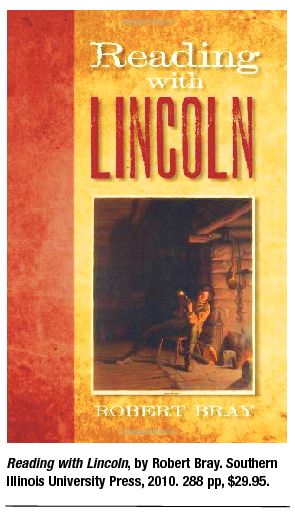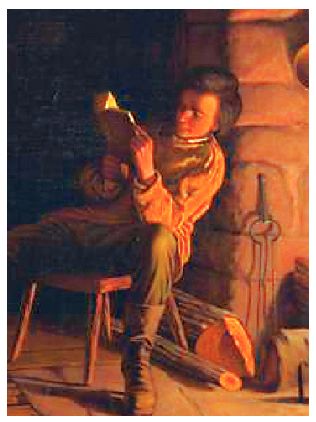What Lincoln read shaped the man, and history
BOOK REVIEW | Julie Cellini

The first book I ever owned was a child-sized version of the life of Abraham Lincoln – a gift from my book-loving father, who was convinced Lincoln read everything he ever got his hands on. His hope was that even as a kindergartener, I’d be inspired to follow Lincoln’s example.
Turns out Dad was wrong. On both counts. In Reading with Lincoln, author Robert Bray, the Colwell Professor of English at Illinois Wesleyan University in Bloomington, lists fewer than six pages of books and poems he deems likely, or even somewhat likely, that Lincoln actually read.
Bray’s list seems short by what we know, or think we know, about Lincoln. But it runs the gamut from Aesop’s Fables to Worchester’s Elements of Ancient and Modern History. In between, it’s a mixed bag. Eleven of Shakespeare’s plays, plus Uncle Tom’s Cabin and even an 1828 edition of Webster’s Dictionary. Bray references most of them, plus scores of other writings, in this densely packed work of information and resources.
Not surprising to anyone who studies Lincoln the politician, the list includes an edition of William H. Seward’s speeches from 1850 to 1860, an indication that politics could trump poetry when Lincoln was plotting his future. It seems likely that Lincoln was researching Seward, who was the clear favorite to win the Republican Party’s nomination for the presidency in 1860. Who knows what Lincoln learned from reading Seward’s speeches? Maybe it’s what helped Lincoln’s supporters outfox and outmaneuver the front-runner, Seward, and capture the nomination that would send Lincoln to the White House on the eve of the Civil War.
What my dad did get right about Lincoln, all those years ago, was that Lincoln’s use of books and printed words to educate himself was key to his life’s story – examples of which Bray serves up on nearly every page.
Bray’s meticulous research and scholarly approach doesn’t make for easy reading. But he demonstrates, again and again, that much of what Lincoln was came from what he read.
Bray contends – through accounts from Lincoln’s cronies and contemporaries and snippets of stories and verses – that what Lincoln read helped define him, both as a person and as a politician. Besides books, Bray shines a light on everything from pamphlets to plays, poems, essays and song lyrics that influenced Lincoln’s thoughts and probably some of his actions.
Considering Lincoln’s apparent passion for Shakespeare, it’s a bit of a surprise that just eleven of the bard’s titles are on the list. Bray contends Lincoln knew most of them by heart, and those he selected he studied and memorized.
Tracing Lincoln from a teenager who wrote letters for his illiterate neighbors and his small circle of friends to his New Salem years when he read works by Thomas Paine and Voltaire, Bray moves to the future president as a man who became a lifelong reader and a writer, making the connections between what he read and how he wrote and spoke.
One image seems to sum up Bray’s book.
It’s Lincoln, reading Shakespeare near the end of his life, but this time it’s from a fine copy, beautifully bound. Bray calls it “a far cry from the cheap, worn, dog-eared Shakespeare” of his early years. Lincoln had come such a long way, but he was still reading, and learning.
Contact Julie Cellini at [email protected].
